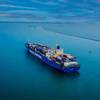Moody's Investors Service downgraded the ratings of American Commercial Lines LLC's $535 million senior secured bank facility to B1 from Ba2 and the $300 million 10.25% senior unsecured notes to B3 from B1.
The Senior Implied rating was lowered to B2 from Ba3 and the issuer rating was lowered to Caa1 from B2.
The rating outlook was changed to stable from negative.
The ratings downgrades is prompted by the substantial deterioration in operating performance resulting from a reduction in grain exports to Asia, higher fuel costs, and low water levels and unusual ice conditions on its U.S. transport routes which severely impacted the fourth quarter of 2000.
As a result, ACL incurred a $9 million loss for the year, despite a $11 million gain on the sale of Watercom, versus net income of $3 million in 1999. Moody's remains concerned over the high level of both on and off-balance sheet debt and the company's ability to meet revised covenants under its secured credit facilities and meet short-term obligations of debt.
Opportunities to reduce debt will be constrained by large interest and lease rent expense burden and the volatility in operating results resulting primarily from fluctuations in grain rates, fuel costs, and river conditions.
Further, Moody's notes that total debt, adjusted for off-balance sheet operating leases, is not expected to materially decrease over the next several years as the company maintains its fleet renewal program. ACL's fleet age is about two years older than the industry average.
ACL recently amended its secured bank credit facilities, to avoid violation of covenants under the agreement's original terms. The amendment, with an effective date of 12/29/00, modified the consolidated leverage and interest coverage ratios, and placed additional limitations on capital expenditures, investments, rent expense, and rent adjusted leverage.
Furthermore, ACL must achieve a $40 million reduction in its secured term loans by 10/31/01, which will most likely require the sale of certain assets. Subsequent to 12/31/01, the financial ratio covenants will reset to their more restrictive original terms. Grain rates remain one of the more volatile components of the company's revenue stream.
In the second half of 2000, Japan and Korea placed import restrictions on corn over concerns of genetically modified StarLink corn. A reduction in Asian demand for U.S. imported grain adversely impacted shipping rates and continues to impact ACL's operations.
Furthermore, a reduction in grain prices prompted farmers to store their supplies, thus reducing barge demand on key routes. Lower water levels restricted movement along waterways and reduced the company's ability to tow a full load of barges, reducing cost efficiency, and unusually severe ice conditions reduced operations and increased maintenance costs due to ice damage.
In addition, high fuel costs have adversely impacted results, with prices reaching a peak of $0.95 gallon in November 2000 (average fuel cost was $0.84 gallon in 2000, 72% higher than 1999 levels). Though fuel costs are currently below these levels, they remain substantially higher than historical levels.
Moody's observes that most of ACL's long-term contracts contain fuel escalator/de-escalator clauses that, combined with hedging, reduce the volatility in operating results caused by changes in fuel prices. These combined factors in 2000 reduced the impact of the price-driven $35 million increase in fuel expense to a $7 million negative impact on operating income.
The ratings, however, also recognize ACL's substantial market share in barge transportation of dry cargo and liquids, its diversity of transported goods, and the economic importance of ACL's operations to its customer base.
Moody's also notes the company's long-standing customer relationships and the long-term contracts under which ACL operates much of its service.
Barge transportation remains the most cost-effective method of transportation for bulk commodities. Management believes that the outlook for grain exports to Asia looks favorable in the near term, aided in part by reduction in bone meal exports from Europe for use as a primary feed product, somewhat offsetting issues related to StarLink corn.
Management also believes that higher fuel and natural gas costs should keep demand for coal transportation relatively stable in the near-term. The company's primary goal in the short-term is to reduce bank debt, improve liquidity and improve margins.
Management has several initiatives to improve cash flow. These include a reduction in capital expenditures, improving barge turn rates, working down inventories at its production facilities, reducing A/R days, restructuring of barge lease terms, and the sale of non-core assets.
The company expects to reduce direct capital spending to $30 to $35 million in 2001, compared to about $62 million in 2000 (including barges acquired through the Peavey acquisition). However, total capital expenditure is expected to be in the $75 million range with the difference provided largely by leasing of its Jeffboat built barges from third parties.
Although Moody's views these initiatives as positive steps for the company, it is uncertain what the impact and timing would be with respect to improving liquidity and operating performance to more acceptable levels.
The stable outlook assumes ACL is able to improve its revenue and cash flow as projected despite the weakening US economy and the uncertainty of the size of grain exports to Asia exacerbated by the current political tension between the U.S. and Asia. Moody's notes positively that much of ACL's barging activity is relatively insensitive to domestic economic slowdown and that, other than for grain, a majority of projected 2001 revenues are already booked under firm contracts.
In October 2000, ACL announced an agreement with Ultrapetrol Ltd to combine their respective inland river barge operations on the Parana/Paraguay River in South America, into a 50/50 joint venture. The JV allows the company to improve its logistical operations in the area and improve the bottom line by reducing empty backhaul miles and should also allow it to better support its major national customers while increasing its customer base; however, there remain issues with general over capacity in this region.
Domestically, ACL still aims to be a lead consolidator in the barge transportation industry as a means to extend service coverage, realize cost savings, and possibly, reduce the average age of its owned fleet (presently about 20 years).
However, Moody's believes that the company's high leverage, restrictive covenants under the secured debt bank agreement, and the current economic environment, will most likely constrain near-term external expansion.
American Commercial Lines LLC, headquartered in Jeffersonville, Indiana, with over 5,000 barges is the leading provider of river barge transportation throughout the inland United States and Gulf Intracoastal Waterway Systems, and is a leading operator on the Orinoco River and the Parana/Paraguay River system in South America with about 450 barges. Through its Jeffboat subsidiary, ACL manufactures towboats and barges and through American Commercial Terminals and Louisiana Dock Company, it provides support services along the inland waterways. - (Reuters)
Sponsored Content
Anschuetz USA: Supporting the U.S. Maritime Industry

Maritime leaders unite to tackle ocean plastic with launch of new alliance: the Maritime Association for Clean Seas

Subscribe for
Maritime Reporter E-News
Maritime Reporter E-News is the maritime industry's largest circulation and most authoritative ENews Service, delivered to your Email five times per week








